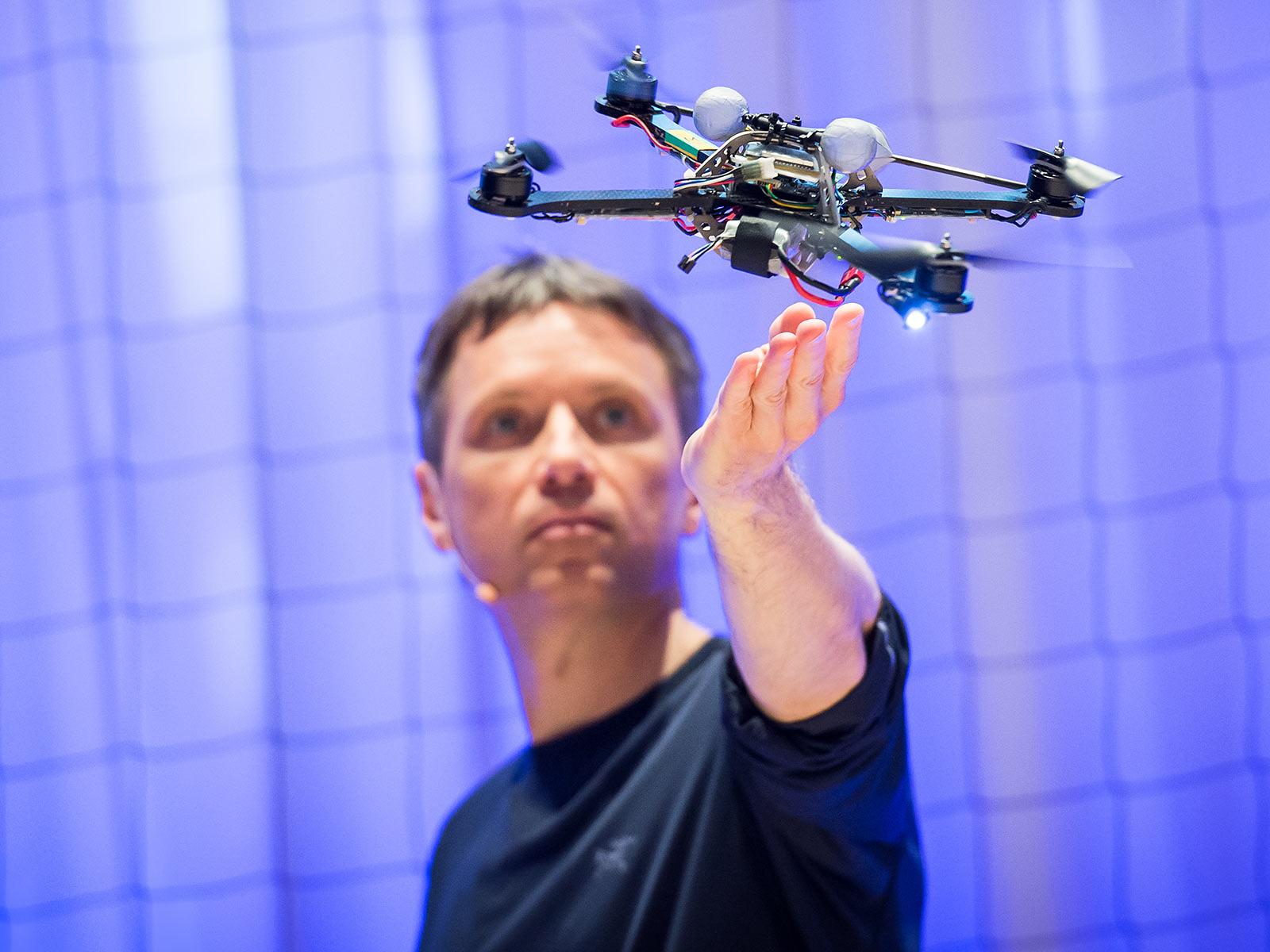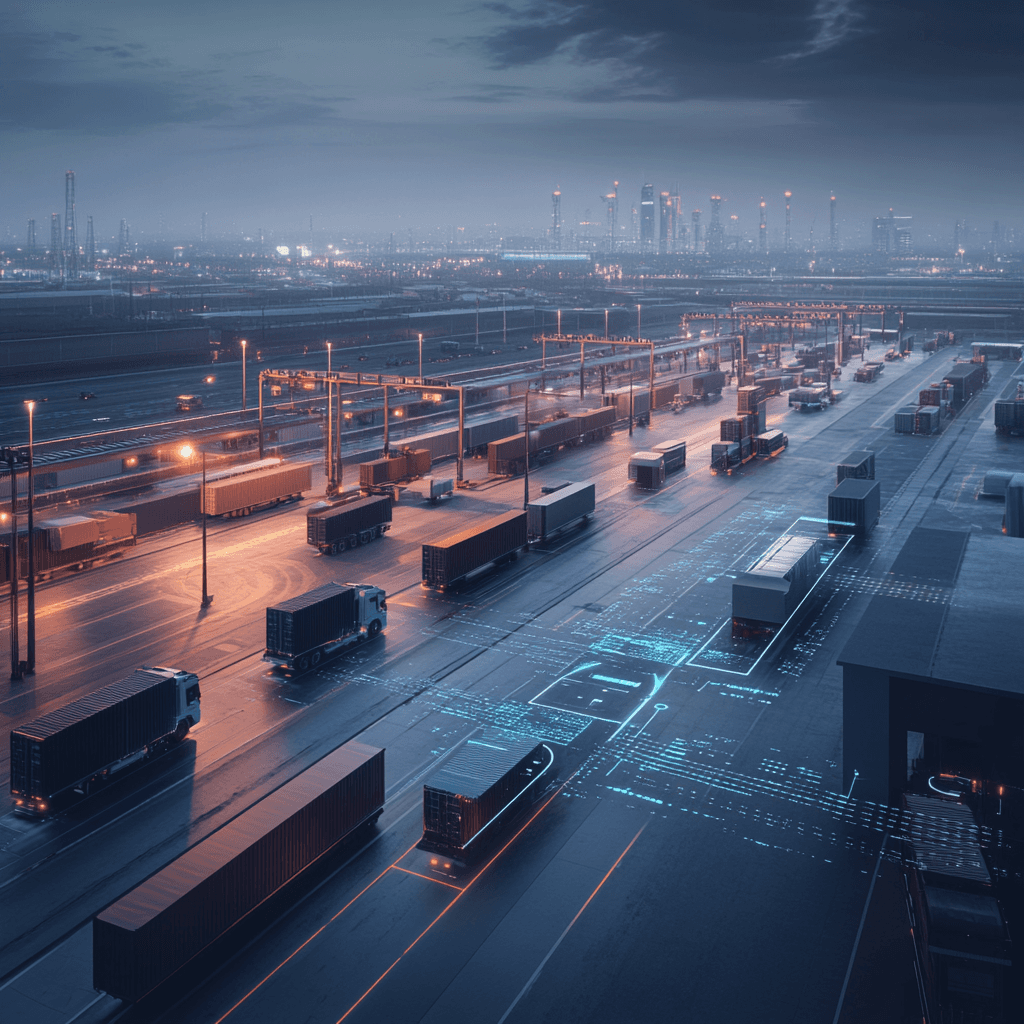
Insights
December 5, 2024
Revolutionizing Logistics: Raffaello D’Andrea Joins the Logistics Hall of Fame!

Insights
December 5, 2024
Revolutionizing Logistics: Raffaello D’Andrea Joins the Logistics Hall of Fame!
Raffaello D’Andrea, a leading visionary in robotics and automation, has been inducted into the prestigious Logistics Hall of Fame. This article delves into his groundbreaking contributions that are transforming logistics on a global scale and reimagining the future of supply chain innovation.
Revolutionizing logistics is no small feat. It demands ingenuity, persistence, and an extraordinary ability to bridge the gap between science fiction and practical, real-world applications. On this front, few individuals have achieved the kind of groundbreaking impact as Raffaello D’Andrea. Known for his visionary contributions to robotics and automation, D’Andrea has transformed the logistics industry by rethinking how goods move and materials are handled, making supply chains more agile, intelligent, and cost-effective. In recognition of his many contributions, he has rightly earned his place in the Logistics Hall of Fame, an honor that celebrates the most influential figures in the field of transportation and supply chain management. This milestone sheds light on not just his past achievements but also his ongoing impact on the future of logistics.
For anyone entrenched in the logistics or transportation industry, Raffaello D’Andrea’s induction into the Logistics Hall of Fame is much more than an accolade. It symbolizes a turning point—a bold new era fueled by robots, algorithms, and artificial intelligence that are reshaping the global supply chain. As automation continues to expand its reach, understanding the significance of D’Andrea's work provides valuable insight into where the industry is headed. This article will explore his accomplishments, his influence on the logistics space, and how his forward-thinking leadership might inspire your own strategies in navigating this fast-evolving landscape.
Raffaello D’Andrea first captured the logistics industry's attention as one of the co-founders of Kiva Systems in 2003. Kiva Systems, acquired by Amazon in 2012 and rebranded as Amazon Robotics, forever altered how e-commerce logistics operated. At its core, Kiva Systems pioneered the use of mobile robotic units for warehouse automation. Instead of moving humans to shelves, Kiva’s solution brought the shelves to humans—a novel concept at the time. This paradigm shift drastically reduced picking times, optimized warehouse layouts, and boosted productivity on an unprecedented scale.
The profound impact of Kiva robotics on fulfillment centers provided the foundation for Amazon’s seamless logistics prowess today. The "goods-to-person" model that D’Andrea helped conceptualize now serves as the gold standard for modern warehouse automation. For executives and supply chain managers, this breakthrough underscored the value of embracing cutting-edge technologies to stay ahead of the curve in a hyper-competitive market.
D’Andrea’s contributions, however, extend far beyond Kiva Systems. As a professor at ETH Zurich, one of the leading research institutions in the world, D’Andrea has tirelessly advanced the boundaries of robotics, artificial intelligence, and systems engineering. His work combines art and science, merging academic theory with practical implementation. His groundbreaking inventions include drones capable of precise movements and intricate maneuvers, robotic systems that offer unprecedented adaptability, and autonomous systems that enhance the interplay between humans and machines.
One of his most famous projects is the Robotic Chair, capable of self-assembling after being knocked down—a stunning visual demonstration of robotic dexterity and resilience. Another remarkable achievement is his work with autonomous drones, particularly in demonstrating swarms of quadcopters engaging in synchronized flight patterns. These innovations transcend logistics and highlight the creative potential of robotics in broader contexts, from healthcare to entertainment.
D’Andrea’s continuous exploration into autonomous systems has tremendous implications for logistics and supply chains. Autonomous vehicles and drones have already begun to make headlines as emerging solutions for last-mile delivery and long-haul freight transport. With his understanding of complex systems and intelligent automation, D’Andrea has set the stage for a future where supply chains are not just efficient but fully autonomous.
His influence extends to practical applications for emerging markets and verticals. For instance, autonomous drones can deliver critical supplies to remote or disaster-affected regions, bypassing traditional transportation challenges such as blocked roads or inaccessible terrain. Similarly, intelligent robots in warehouses can carry out 24/7 operations, reducing costs while meeting the ever-increasing consumer demand for faster delivery times.
The Logistics Hall of Fame was established to honor influential figures who have made permanent contributions to the development of logistics and supply chain management. Past honorees have included legendary innovators like Eugene Clark and Frederick McKinley Jones, whose innovations laid the foundation for the modern logistics landscape. Raffaello D’Andrea's inclusion in this prestigious hall signifies recognition of his unique ability to combine technological prowess with creative problem-solving, ultimately reshaping what logistics can achieve.
For supply chain leaders, his work serves as a vivid reminder of why innovation matters. As costs rise, labor challenges grow, and sustainability becomes a pressing priority, it’s essential to find transformative solutions. D’Andrea’s journey demonstrates the potential of leveraging robotics and AI to address these pain points with scalable, efficient solutions.
But what lessons can today’s executives and managers take from D’Andrea's work? One clear takeaway is the importance of viewing technology not as a replacement for human intelligence but as an augmenting force. By aligning robotic systems with human decision-making abilities, organizations can unlock new efficiencies without compromising flexibility or adaptability. This concept of collaboration between humans and machines is expected to further enrich the future of work in logistics, creating an environment where both can operate at their highest potential.
Another important insight revolves around the need for bold experimentation. D’Andrea's work exemplifies the benefits of stepping into uncharted territories and embracing failure as a natural part of innovation. Whether exploring predictive analytics or testing artificial intelligence applications, companies can draw from this philosophy to better position themselves for the demands of tomorrow's global supply chains.
D’Andrea’s contributions also emphasize the critical role of sustainability within modern logistics. Automation and robotics are key to reducing energy consumption, minimizing waste, and improving resource allocation. As corporate responsibility gains increasing importance among consumers and stakeholders, taking cues from D’Andrea’s focus on efficiency can help logistics firms align their practices with long-term sustainability goals.
Looking to the future, automation will continue to play an ever-expanding role across the supply chain, encompassing everything from ports to warehouses to delivery networks. However, D’Andrea’s induction into the Logistics Hall of Fame is not just a recognition of what he has already accomplished but a signal of what lies ahead. At the intersection of AI, IoT, and autonomous vehicles, the boundaries of modern logistics will be continually stretched. Staying informed on these trends and tapping into forward-thinking solutions will be essential for supply chain executives aiming to remain competitive.
For those in positions of leadership, D’Andrea's legacy serves as motivation to think broadly about the logistics industry’s transformation. Whether by encouraging innovation within one’s own organization or fostering collaboration with technology partners, being proactive in exploring advanced solutions can define the success of tomorrow’s operations. His example proves that combining imagination with functionality can lead to results that aren’t just impactful but revolutionary.
As Raffaello D’Andrea takes his place among the titans of logistics and supply chain management, his story underscores a simple yet powerful truth: the future will be written by those who dare to rethink the status quo. By celebrating his induction into the Logistics Hall of Fame, the industry honors his achievements, derives inspiration for future innovations, and acknowledges that the logistics space is entering a transformative new chapter.
In conclusion, Raffaello D’Andrea's inclusion in the Logistics Hall of Fame isn’t simply about commemorating his contributions—it’s about spotlighting an ongoing movement toward making logistics faster, smarter, and more sustainable. His profound influence redefines what’s possible in the interplay of robotics and supply chain management, serving as both a blueprint and a challenge for those who wish to follow in his footsteps. As we stand on the cusp of a robotics revolution that promises to reshape transportation and logistics forever, D’Andrea’s work reminds us all to think bigger, aim higher, and embrace change.
Revolutionizing logistics is no small feat. It demands ingenuity, persistence, and an extraordinary ability to bridge the gap between science fiction and practical, real-world applications. On this front, few individuals have achieved the kind of groundbreaking impact as Raffaello D’Andrea. Known for his visionary contributions to robotics and automation, D’Andrea has transformed the logistics industry by rethinking how goods move and materials are handled, making supply chains more agile, intelligent, and cost-effective. In recognition of his many contributions, he has rightly earned his place in the Logistics Hall of Fame, an honor that celebrates the most influential figures in the field of transportation and supply chain management. This milestone sheds light on not just his past achievements but also his ongoing impact on the future of logistics.
For anyone entrenched in the logistics or transportation industry, Raffaello D’Andrea’s induction into the Logistics Hall of Fame is much more than an accolade. It symbolizes a turning point—a bold new era fueled by robots, algorithms, and artificial intelligence that are reshaping the global supply chain. As automation continues to expand its reach, understanding the significance of D’Andrea's work provides valuable insight into where the industry is headed. This article will explore his accomplishments, his influence on the logistics space, and how his forward-thinking leadership might inspire your own strategies in navigating this fast-evolving landscape.
Raffaello D’Andrea first captured the logistics industry's attention as one of the co-founders of Kiva Systems in 2003. Kiva Systems, acquired by Amazon in 2012 and rebranded as Amazon Robotics, forever altered how e-commerce logistics operated. At its core, Kiva Systems pioneered the use of mobile robotic units for warehouse automation. Instead of moving humans to shelves, Kiva’s solution brought the shelves to humans—a novel concept at the time. This paradigm shift drastically reduced picking times, optimized warehouse layouts, and boosted productivity on an unprecedented scale.
The profound impact of Kiva robotics on fulfillment centers provided the foundation for Amazon’s seamless logistics prowess today. The "goods-to-person" model that D’Andrea helped conceptualize now serves as the gold standard for modern warehouse automation. For executives and supply chain managers, this breakthrough underscored the value of embracing cutting-edge technologies to stay ahead of the curve in a hyper-competitive market.
D’Andrea’s contributions, however, extend far beyond Kiva Systems. As a professor at ETH Zurich, one of the leading research institutions in the world, D’Andrea has tirelessly advanced the boundaries of robotics, artificial intelligence, and systems engineering. His work combines art and science, merging academic theory with practical implementation. His groundbreaking inventions include drones capable of precise movements and intricate maneuvers, robotic systems that offer unprecedented adaptability, and autonomous systems that enhance the interplay between humans and machines.
One of his most famous projects is the Robotic Chair, capable of self-assembling after being knocked down—a stunning visual demonstration of robotic dexterity and resilience. Another remarkable achievement is his work with autonomous drones, particularly in demonstrating swarms of quadcopters engaging in synchronized flight patterns. These innovations transcend logistics and highlight the creative potential of robotics in broader contexts, from healthcare to entertainment.
D’Andrea’s continuous exploration into autonomous systems has tremendous implications for logistics and supply chains. Autonomous vehicles and drones have already begun to make headlines as emerging solutions for last-mile delivery and long-haul freight transport. With his understanding of complex systems and intelligent automation, D’Andrea has set the stage for a future where supply chains are not just efficient but fully autonomous.
His influence extends to practical applications for emerging markets and verticals. For instance, autonomous drones can deliver critical supplies to remote or disaster-affected regions, bypassing traditional transportation challenges such as blocked roads or inaccessible terrain. Similarly, intelligent robots in warehouses can carry out 24/7 operations, reducing costs while meeting the ever-increasing consumer demand for faster delivery times.
The Logistics Hall of Fame was established to honor influential figures who have made permanent contributions to the development of logistics and supply chain management. Past honorees have included legendary innovators like Eugene Clark and Frederick McKinley Jones, whose innovations laid the foundation for the modern logistics landscape. Raffaello D’Andrea's inclusion in this prestigious hall signifies recognition of his unique ability to combine technological prowess with creative problem-solving, ultimately reshaping what logistics can achieve.
For supply chain leaders, his work serves as a vivid reminder of why innovation matters. As costs rise, labor challenges grow, and sustainability becomes a pressing priority, it’s essential to find transformative solutions. D’Andrea’s journey demonstrates the potential of leveraging robotics and AI to address these pain points with scalable, efficient solutions.
But what lessons can today’s executives and managers take from D’Andrea's work? One clear takeaway is the importance of viewing technology not as a replacement for human intelligence but as an augmenting force. By aligning robotic systems with human decision-making abilities, organizations can unlock new efficiencies without compromising flexibility or adaptability. This concept of collaboration between humans and machines is expected to further enrich the future of work in logistics, creating an environment where both can operate at their highest potential.
Another important insight revolves around the need for bold experimentation. D’Andrea's work exemplifies the benefits of stepping into uncharted territories and embracing failure as a natural part of innovation. Whether exploring predictive analytics or testing artificial intelligence applications, companies can draw from this philosophy to better position themselves for the demands of tomorrow's global supply chains.
D’Andrea’s contributions also emphasize the critical role of sustainability within modern logistics. Automation and robotics are key to reducing energy consumption, minimizing waste, and improving resource allocation. As corporate responsibility gains increasing importance among consumers and stakeholders, taking cues from D’Andrea’s focus on efficiency can help logistics firms align their practices with long-term sustainability goals.
Looking to the future, automation will continue to play an ever-expanding role across the supply chain, encompassing everything from ports to warehouses to delivery networks. However, D’Andrea’s induction into the Logistics Hall of Fame is not just a recognition of what he has already accomplished but a signal of what lies ahead. At the intersection of AI, IoT, and autonomous vehicles, the boundaries of modern logistics will be continually stretched. Staying informed on these trends and tapping into forward-thinking solutions will be essential for supply chain executives aiming to remain competitive.
For those in positions of leadership, D’Andrea's legacy serves as motivation to think broadly about the logistics industry’s transformation. Whether by encouraging innovation within one’s own organization or fostering collaboration with technology partners, being proactive in exploring advanced solutions can define the success of tomorrow’s operations. His example proves that combining imagination with functionality can lead to results that aren’t just impactful but revolutionary.
As Raffaello D’Andrea takes his place among the titans of logistics and supply chain management, his story underscores a simple yet powerful truth: the future will be written by those who dare to rethink the status quo. By celebrating his induction into the Logistics Hall of Fame, the industry honors his achievements, derives inspiration for future innovations, and acknowledges that the logistics space is entering a transformative new chapter.
In conclusion, Raffaello D’Andrea's inclusion in the Logistics Hall of Fame isn’t simply about commemorating his contributions—it’s about spotlighting an ongoing movement toward making logistics faster, smarter, and more sustainable. His profound influence redefines what’s possible in the interplay of robotics and supply chain management, serving as both a blueprint and a challenge for those who wish to follow in his footsteps. As we stand on the cusp of a robotics revolution that promises to reshape transportation and logistics forever, D’Andrea’s work reminds us all to think bigger, aim higher, and embrace change.
Raffaello D’Andrea, a leading visionary in robotics and automation, has been inducted into the prestigious Logistics Hall of Fame. This article delves into his groundbreaking contributions that are transforming logistics on a global scale and reimagining the future of supply chain innovation.
Revolutionizing logistics is no small feat. It demands ingenuity, persistence, and an extraordinary ability to bridge the gap between science fiction and practical, real-world applications. On this front, few individuals have achieved the kind of groundbreaking impact as Raffaello D’Andrea. Known for his visionary contributions to robotics and automation, D’Andrea has transformed the logistics industry by rethinking how goods move and materials are handled, making supply chains more agile, intelligent, and cost-effective. In recognition of his many contributions, he has rightly earned his place in the Logistics Hall of Fame, an honor that celebrates the most influential figures in the field of transportation and supply chain management. This milestone sheds light on not just his past achievements but also his ongoing impact on the future of logistics.
For anyone entrenched in the logistics or transportation industry, Raffaello D’Andrea’s induction into the Logistics Hall of Fame is much more than an accolade. It symbolizes a turning point—a bold new era fueled by robots, algorithms, and artificial intelligence that are reshaping the global supply chain. As automation continues to expand its reach, understanding the significance of D’Andrea's work provides valuable insight into where the industry is headed. This article will explore his accomplishments, his influence on the logistics space, and how his forward-thinking leadership might inspire your own strategies in navigating this fast-evolving landscape.
Raffaello D’Andrea first captured the logistics industry's attention as one of the co-founders of Kiva Systems in 2003. Kiva Systems, acquired by Amazon in 2012 and rebranded as Amazon Robotics, forever altered how e-commerce logistics operated. At its core, Kiva Systems pioneered the use of mobile robotic units for warehouse automation. Instead of moving humans to shelves, Kiva’s solution brought the shelves to humans—a novel concept at the time. This paradigm shift drastically reduced picking times, optimized warehouse layouts, and boosted productivity on an unprecedented scale.
The profound impact of Kiva robotics on fulfillment centers provided the foundation for Amazon’s seamless logistics prowess today. The "goods-to-person" model that D’Andrea helped conceptualize now serves as the gold standard for modern warehouse automation. For executives and supply chain managers, this breakthrough underscored the value of embracing cutting-edge technologies to stay ahead of the curve in a hyper-competitive market.
D’Andrea’s contributions, however, extend far beyond Kiva Systems. As a professor at ETH Zurich, one of the leading research institutions in the world, D’Andrea has tirelessly advanced the boundaries of robotics, artificial intelligence, and systems engineering. His work combines art and science, merging academic theory with practical implementation. His groundbreaking inventions include drones capable of precise movements and intricate maneuvers, robotic systems that offer unprecedented adaptability, and autonomous systems that enhance the interplay between humans and machines.
One of his most famous projects is the Robotic Chair, capable of self-assembling after being knocked down—a stunning visual demonstration of robotic dexterity and resilience. Another remarkable achievement is his work with autonomous drones, particularly in demonstrating swarms of quadcopters engaging in synchronized flight patterns. These innovations transcend logistics and highlight the creative potential of robotics in broader contexts, from healthcare to entertainment.
D’Andrea’s continuous exploration into autonomous systems has tremendous implications for logistics and supply chains. Autonomous vehicles and drones have already begun to make headlines as emerging solutions for last-mile delivery and long-haul freight transport. With his understanding of complex systems and intelligent automation, D’Andrea has set the stage for a future where supply chains are not just efficient but fully autonomous.
His influence extends to practical applications for emerging markets and verticals. For instance, autonomous drones can deliver critical supplies to remote or disaster-affected regions, bypassing traditional transportation challenges such as blocked roads or inaccessible terrain. Similarly, intelligent robots in warehouses can carry out 24/7 operations, reducing costs while meeting the ever-increasing consumer demand for faster delivery times.
The Logistics Hall of Fame was established to honor influential figures who have made permanent contributions to the development of logistics and supply chain management. Past honorees have included legendary innovators like Eugene Clark and Frederick McKinley Jones, whose innovations laid the foundation for the modern logistics landscape. Raffaello D’Andrea's inclusion in this prestigious hall signifies recognition of his unique ability to combine technological prowess with creative problem-solving, ultimately reshaping what logistics can achieve.
For supply chain leaders, his work serves as a vivid reminder of why innovation matters. As costs rise, labor challenges grow, and sustainability becomes a pressing priority, it’s essential to find transformative solutions. D’Andrea’s journey demonstrates the potential of leveraging robotics and AI to address these pain points with scalable, efficient solutions.
But what lessons can today’s executives and managers take from D’Andrea's work? One clear takeaway is the importance of viewing technology not as a replacement for human intelligence but as an augmenting force. By aligning robotic systems with human decision-making abilities, organizations can unlock new efficiencies without compromising flexibility or adaptability. This concept of collaboration between humans and machines is expected to further enrich the future of work in logistics, creating an environment where both can operate at their highest potential.
Another important insight revolves around the need for bold experimentation. D’Andrea's work exemplifies the benefits of stepping into uncharted territories and embracing failure as a natural part of innovation. Whether exploring predictive analytics or testing artificial intelligence applications, companies can draw from this philosophy to better position themselves for the demands of tomorrow's global supply chains.
D’Andrea’s contributions also emphasize the critical role of sustainability within modern logistics. Automation and robotics are key to reducing energy consumption, minimizing waste, and improving resource allocation. As corporate responsibility gains increasing importance among consumers and stakeholders, taking cues from D’Andrea’s focus on efficiency can help logistics firms align their practices with long-term sustainability goals.
Looking to the future, automation will continue to play an ever-expanding role across the supply chain, encompassing everything from ports to warehouses to delivery networks. However, D’Andrea’s induction into the Logistics Hall of Fame is not just a recognition of what he has already accomplished but a signal of what lies ahead. At the intersection of AI, IoT, and autonomous vehicles, the boundaries of modern logistics will be continually stretched. Staying informed on these trends and tapping into forward-thinking solutions will be essential for supply chain executives aiming to remain competitive.
For those in positions of leadership, D’Andrea's legacy serves as motivation to think broadly about the logistics industry’s transformation. Whether by encouraging innovation within one’s own organization or fostering collaboration with technology partners, being proactive in exploring advanced solutions can define the success of tomorrow’s operations. His example proves that combining imagination with functionality can lead to results that aren’t just impactful but revolutionary.
As Raffaello D’Andrea takes his place among the titans of logistics and supply chain management, his story underscores a simple yet powerful truth: the future will be written by those who dare to rethink the status quo. By celebrating his induction into the Logistics Hall of Fame, the industry honors his achievements, derives inspiration for future innovations, and acknowledges that the logistics space is entering a transformative new chapter.
In conclusion, Raffaello D’Andrea's inclusion in the Logistics Hall of Fame isn’t simply about commemorating his contributions—it’s about spotlighting an ongoing movement toward making logistics faster, smarter, and more sustainable. His profound influence redefines what’s possible in the interplay of robotics and supply chain management, serving as both a blueprint and a challenge for those who wish to follow in his footsteps. As we stand on the cusp of a robotics revolution that promises to reshape transportation and logistics forever, D’Andrea’s work reminds us all to think bigger, aim higher, and embrace change.
Other Blogs
Other Blogs
Check our other project Blogs with useful insight and information for your businesses
Other Blogs
Other Blogs
Check our other project Blogs with useful insight and information for your businesses
Other Blogs
Other Blogs
Check our other project Blogs with useful insight and information for your businesses


